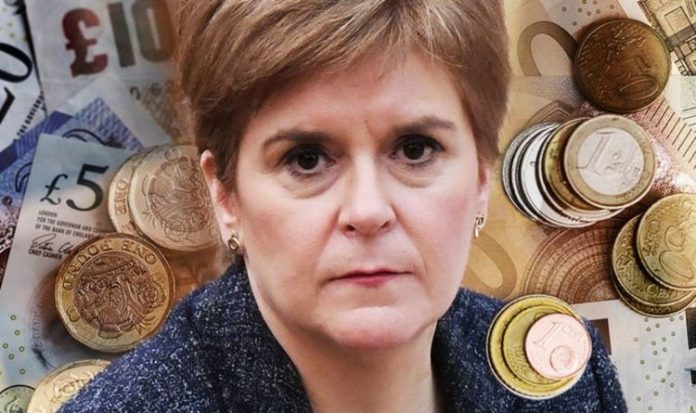However, with there being scant possibility of an independent Scotland continuing to use pound sterling, and signing up to the euro likely to take at least a decade, financial expert Joe Ray has warned First Minister Nicola Sturgeon she may be left with little choice but to do just that. Mr Ray, who is social investment and innovation adviser at People’s Postcode Lottery, pointed to recent opinion polling which suggests widespread support for independence north of the border.
However, he told Scots it was likely to be a case of careful what they wished for.
Mr Ray wrote in City AM: “Should a further referendum happen, the separatists will be promising the loss of the fiscal transfer presently worth at least £10bn, the severing of Scotland from a UK single market worth almost 30 per cent of its GDP, and above all, the financial chaos set to be unleashed by the SNP’s currency plan.”
And with specific reference to which currency Scotland will use after going it alone, he said: “Even among separatists support for retaining sterling is high.

Nicola Sturgeon has warned an independent Scotland would not be able to use the pound (Image: GETTY)

Many recent polls – including this Ipsos MORI one – have suggested support for independence (Image: Ipsos MORI)
“A recent poll found that, post-secession, 54 per cent of respondents support using the UK’s currency permanently, with only five per cent in favour of establishing a brand new Scottish currency.
“Unfortunately for the nationalists, the Scottish electorate’s most unpopular currency option is also the most likely.”
Mr Ray said a permanent currency union with the UK would never be accepted by voters in England, while what he termed “sterlingisation” would rattle the financial markets, and could even breach EU membership criteria.
JUST IN: Turkey vs Greece: Erdogan’s ‘illegal’ manoeuvres risk ‘hot incident’

Scotland currently uses pounds sterling (Image: GETTY)
He added: “Using the euro, meanwhile, is only possible as a full member of the European Union – a process that by the SNP’s own estimation will take at least 10 years.
“The money does not exist to finance a currency peg, so the only option available to a separate Scotland is the creation of a free floating currency.”
The problem lay in the SNP’s intention to issue a new currency as legal tender while simultaneously keeping all exiting debts in sterling.
DON’T MISS
Council chiefs fire back over fears Nicola Sturgeon could place Lanarkshire in lockdown [LATEST]
Unelected Lord issues meddling warning to Boris on Scottish indy [INSIGHT]
SNP’s new hate crime law could see people prosecuted [REVEAL]

Nicola Sturgeon, Scotland’s First Minister (Image: GETTY)

Even if Scotland did join the EU, it would take time to become a member of the eurozone (Image: GETTY)
Such a move would pose a “tremendous risk” for anyone who holds debts in sterling who would receive income in the new Scottish currency – meaning almost every Scottish citizen and institution with repayable debts of any value.
Mr Ray explained: “There are over 700,000 mortgage holders in Scotland, collectively housing just under two million people. Local authorities hold debts of £18bn.
“Scottish housing associations owe £4billion. The Scottish government’s share of the UK national debt will be denominated in sterling.

Independence campaigners in the 2014 referendum (Image: GETTY)
“All would be materially affected by a decline in the Scottish currency.”
He added: “A 25–30 per cent decrease against sterling is entirely possible and holds the capacity to cause severe financial stress.
“The case for a rapid devaluation of the fledgeling Scottish currency is not difficult to make.
“Post-secession, the Scottish government’s share of the UK’s national debt would be well over 100 per cent of GDP, the loss of the Barnett Formula would result in massive public expenditure cuts, the new currency would find itself under assault by the financial markets, and mass capital flight would likely ensue.

A pro-independence sticker on a sign at the Scottish border (Image: GETTY)
“Meanwhile, sterling would remain a global reserve currency, home to the world’s biggest financial centre and still one of the largest economies on the planet.”
Mr Ray suggested pro-Union campaigners could do worse than focus on the issue in a future independence referendum.
He said: “The risk that the new Scottish currency poses to people’s mortgages, pensions and incomes allows for targeted messaging that can demonstrate to individual voters exactly how much they stand to lose from Scottish secession in a way that remote debates about trade can struggle to.
“Should we have to endure another Scottish referendum, Unionists could do a lot worse than basing their campaign around ensuring voters head into the polling booth asking themselves: ‘What currency will I be repaying my mortgage in – the pound or the groat?'”







